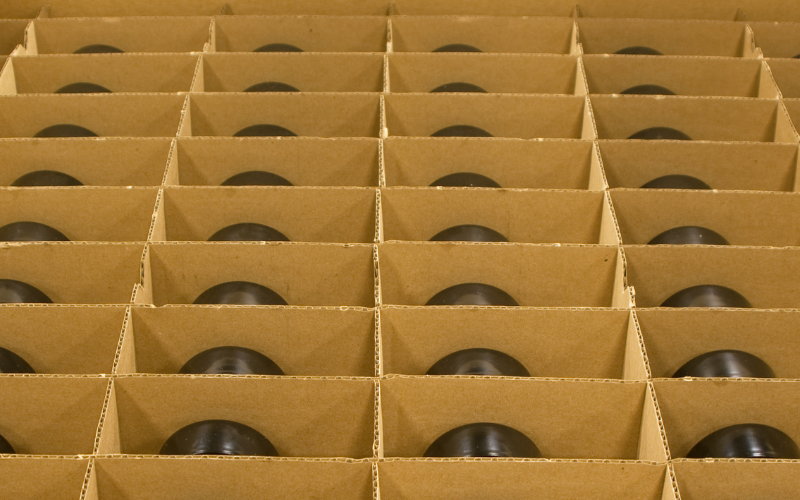Shipping expenses are significant costs in logistics and supply chain management. Companies are then always looking for ways to lower these expenses without sacrificing the safety and effectiveness of their operations.
Two efficient approaches include utilising slip sheets and dunnage bags. These modern tools can aid in reducing shipping costs while upholding superior standards in cargo handling and safety.
Explore how these shipping materials reduce costs and learn how integrating a forklift weighing scale into the operations can contribute to improved efficiency and cost reduction.
The Cost-Saving Benefits of Slip Sheets
Lightweight and Space-Saving
Slip sheets are thin sheets made from plastic, fiberboard, or corrugated materials. They are designed to replace traditional wooden pallets in material handling and shipping. One of the primary advantages of slip sheets is their lightweight nature. Unlike heavy wooden pallets, slip sheets significantly reduce the overall weight of shipments. This weight reduction can lower shipping costs, especially for air and sea freight where weight is critical.
Additionally, slip sheets take up less space compared to pallets. This space-saving feature allows for more efficient use of container or truck space, enabling businesses to ship more products in a single load. By maximising the use of available space, companies can reduce the number of shipments required, leading to substantial cost savings.
Cost-Effective and Eco-Friendly
Slip sheets are generally more cost effective than traditional pallets. They are cheaper to produce, and their lightweight nature means lower transportation costs. Furthermore, slip sheets are recyclable and can be reused multiple times, making them an eco-friendly option. The reduced need for new pallets also lowers the demand for wood, contributing to environmental sustainability.
Improved Handling Efficiency
Using slip sheets requires specialised handling equipment, such as forklifts with push-pull attachments. These attachments can grab the lip of the slip sheet and pull the load onto the forklifts. Integrating a forklift weighing scale into this process can also enhance handling efficiency. The forklift weighing scale allows operators to weigh loads quickly and accurately during handling, ensuring compliance with weight regulations and optimising load distribution.
The Role of Dunnage Bags in Reducing Shipping Costs
Enhanced Cargo Protection
Dunnage bags, also known as airbags or inflatable bags, are used to secure and stabilise cargo within shipping containers, trucks, and railcars. These bags are placed in the voids between cargo to prevent movement during transit. By filling gaps and preventing shifting, dunnage bags protect goods from damage, reducing the likelihood of costly claims and returns.
Versatility and Ease of Use
Dunnage bags are versatile and can be used with various types of cargo, including boxes, drums, and irregularly shaped items. They come in different sizes and materials to suit specific needs and load requirements. Dunnage bags are easy to install and inflate, requiring minimal labour and time. This ease of use translates to faster loading and unloading times, reducing labour costs and improving overall efficiency.
Cost-Effective Solution
Using dunnage bags is a cost-effective way to ensure cargo safety without investing in expensive dunnage materials or complex securing systems. Dunnage bags are relatively inexpensive and can be reused multiple times, providing excellent value for money. By preventing cargo damage and reducing the need for additional securing materials, dunnage bags contribute to significant cost savings in shipping operations.
Combining Slip Sheets and Dunnage Bags for Maximum Savings
Optimised Load Distribution
Combining slip sheets and dunnage bags can optimise load distribution within containers and trucks. Slip sheets allow for the efficient stacking of goods, while dunnage bags fill any remaining voids to prevent movement. This combination ensures that space is used effectively, reducing the number of shipments required and lowering transportation costs.
Reduced Handling and Labour Costs
Using slip sheets and dunnage bags can streamline loading and unloading processes, reducing the time and labour required. Slip sheets eliminate the need for pallet handling, while dunnage bags provide quick and secure cargo stabilisation. These efficiencies translate to lower labour costs and faster turnaround times, contributing to overall cost savings.
Improved Safety and Compliance
Both slip sheets and dunnage bags contribute to safer handling and transportation of goods. Slip sheets reduce the risk of injuries associated with heavy pallet handling, and dunnage bags prevent cargo from shifting, reducing the likelihood of accidents during transit. Ensuring safety and compliance with industry standards can avoid costly fines and legal issues.
Conclusion
Integrating slip sheets and dunnage bags in shipping processes presents various advantages, including lower shipping expenses, increased productivity, and enhanced cargo safety. These resources offer a cost-efficient and environmentally friendly option than conventional pallets and securing techniques. Moreover, including a forklift weighing scale can enhance load management and lead to substantial cost reductions. By implementing these modern solutions, companies can surely attain more streamlined and economical shipping operations.
Visit Sunstream to build a more sustainable and profitable future for your shipping needs.

